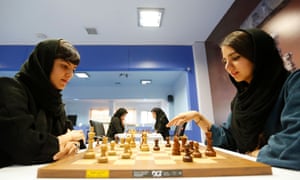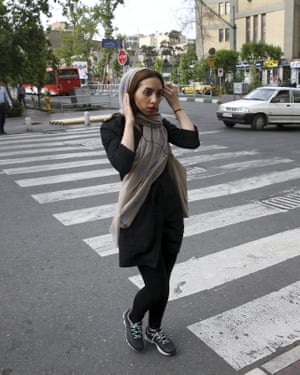Playing Chess in the Islamic Republic of Iran
"Iran [Iranian Chess Federation volunteered to organize and host the international women's chess championship] was the only country which made a proposal to host the event."
"There were no complaints from the players or officials and everybody respected the laws of the country [whereby the Islamic Republic of Iran officially requires all women in the country to wear a hijab covering their hair]."
FIDE, the World Chess Federation
"I'm protesting FIDE's decision not because of Iran's religion or people, but for the government's laws that are restricting my rights as a woman."
"I think it's unacceptable to host a WOMEN'S World Championship in a place where women do not have basic fundamental rights and are treated as second-class citizens."
"For those saying that I don't know anything about Iran: I have received the most support and gratitude from the people of Iran, who are facing this situation every day."
Nazi Paikidze, 22-year-old chess star, U.S. women's champion
 |
| Iranian grandmasters Mitra Hejazipour and Sara Khadem. ‘Iranian women are not afraid of these detentions by the morality police.’ Photograph: Atta Kenare/AFP/Getty Images |
Ms. Paikidze feels vindicated in her decision to boycott the chess championship event being held in Iran, because she is personally offended both for herself and for all women taking part in the event, as well as being put off by the fact that all Iranian women are obliged by law to wear the head covering, like it or not. Those Iranian women who demonstrate insufficient dedication to modesty by the casual wearing of a hijab in a clear move to diminish its importance and their taking it seriously, are actually arrested by the morality police and placed in prison for a short stay.
 |
| Iranian women are not afraid to not comply to hijab rules. Photograph: Vahid Salemi/AP |
In the West there is an ongoing debate about Muslim women living in Europe or North America wearing the chador, the niqab, the burqa, all of which are meant to completely cover a woman's body and her face. The wearing of the modest hijab raises not so much as an eyebrow, since it covers only a woman's hair, not her face, not her body. But in the Republic where it is an enforced rule that women must wear the hijab at the very least, women balk and chafe and silently remonstrate by collectively taking a casual approach.
What offends Ms. Paikidze and others planning to arrive in Iran to take part in the championship, who are not Muslim, is that the rule applies to them as well. It is one thing for women, out of a sense of respect for a religious dictate to take it upon themselves to don a hijab, it is another thing entirely to make it an issue formally that women must, without exception, hew to the same law, foreigner or not, non-Muslim notwithstanding, as Iranian women must do, or face the punishment of a prison cell.
It is a matter of personal agency, the sovereign individual and her dignity of choice.
It is also a reflection of a woman's place in Iranian society, thanks to the Iranian Revolution that brought the Ayatollahs and their puritanical view of Islamism to power. Changing what had been a cosmopolitan country to a severely rigid one where religion takes second place to nothing. It is that view of Islam that served to inspire the virulent hard line of Muslim extremism that now roils the world stage, alongside the similar puritanism of Salafist Islam practised through Wahhabism by Saudi Arabia, importing its version throughout the world stage.
And it is that kind of Islam that mandates capital punishment for political dissenters, those of other religious sects, those who voluntarily discard Islam and move to another religion, homosexuals and those accused of disrespect to Islam, to the Prophet Mohammad, and to the Iranian government. It is this brand of Islam that disregards the alternate citizenship of visiting Iranians who reside in the West, holding dual citizenship and who are viewed by Tehran as a threat, and imprisoned, and sometimes tortured, occasionally dying in prison.
There are 64 world chess players geared to compete in this event garnering more than its measure of controversy by insulted and disgruntled participants. The federation that represents the best interests of the female chess masters who will be taking part in this international competition has served them ill indeed.
 |
| US champion chess player Nazi Paikidze-Barnes is boycotting the world championships in Iran. CNN |
Labels: Iran, Islamism, Political Realities
0 Comments:
Post a Comment
<< Home